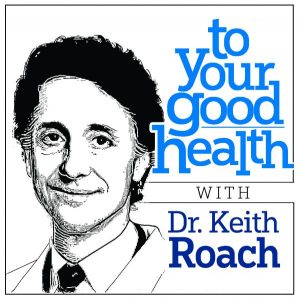TO YOUR GOOD HEALTH Can Prilosec be taken for more than 14 days?
By Dr. Keith Roach — April 24, 2022 DEAR DR. ROACH: What’s the story with Prilosec? Doctors routinely tell people with GERD or acid stomach to take this forever. Yet it clearly describes only a 14-day treatment on the box. A physician assistant told me that because of a rare infrequent condition some users have that the manufacturer is legally bound to post the 14-day limit, but that the general population can safely ignore it. Can you enlighten and reassure those of us whose physicians have said to take it long term? — C.D.C.
DEAR DR. ROACH: What’s the story with Prilosec? Doctors routinely tell people with GERD or acid stomach to take this forever. Yet it clearly describes only a 14-day treatment on the box. A physician assistant told me that because of a rare infrequent condition some users have that the manufacturer is legally bound to post the 14-day limit, but that the general population can safely ignore it. Can you enlighten and reassure those of us whose physicians have said to take it long term? — C.D.C.
ANSWER: The patient instructions in the over-the-counter versions of proton pump inhibitors, such as omeprazole (Prilosec), do recommend a 14-day course. However, longer courses may indeed be prescribed by a licensed prescriber, such as a PA. Even so, there are relatively few people who need lifelong medication. Those who do may have a condition such as Barrett’s esophagus, in which PPIs — the most potent medical treatment to suppress stomach acid — are necessary. They not only relieve symptoms, they are also prescribed in hopes of reducing the risk of developing cancer of the esophagus. The data on this are still not clear.
For people with acid reflux (also called gastroesophageal reflux disease), PPIs are usually not needed lifelong. However, it may still be reasonable to use these drugs long term if the prescriber feels the benefit outweighs the risk.
There are several risks of long-term use of PPIs. Stomach acids are important in protecting against bacteria, and two kinds of bacterial infections are more common in PPI users. The first is in the colon, especially of Clostridium difficile, where PPI users are about 30 percent more likely to be infected and may do so even without the antibiotic use that is the most common risk factor for C. diff. The second is pneumonia, although the apparent association may not be as strong as formerly thought.
Low stomach acid may decrease absorption of vitamins and minerals, especially magnesium, iron and vitamin B12.
PPIs were thought to increase the risk of a rare tumor, gastric carcinoid, based on data from rats, and of colon cancer. Those risks have not been seen in humans. Early data suggest increased risk of kidney disease and dementia. That risk appears to be small, if it even exists.
Long-term PPI use has some risk of side effects and should be used only when there are benefits to PPIs that can’t be obtained with other treatments, including other medications and lifestyle changes. This especially includes better diet, weight loss when appropriate and not eating right before bed.
***
DEAR DR. ROACH: I’m not against medical marijuana when prescribed, but why do patients want or need to smoke it? What does the secondhand smoke do to children and adults around those who are smoking it? — C.G.
ANSWER: Secondhand cannabis smoke has potential adverse effects. It can be irritating to the eyes and respiratory tract. The psychoactive component, THC, can be absorbed by someone in close proximity, especially if exposed over a prolonged period. This is also true for the vapor made by an e-cigarette device.
Cannabis smoke is irritating for the user as well. Many people who use medical cannabis use edibles containing extracts, THC and CBD. These have no risk to others, although they do carry a higher risk of acute intoxication for the user. In any event, cannabis users should take care not to expose people who do not want to be exposed, especially children.
Dr. Roach regrets that he is unable to answer individual questions, but will incorporate them in the column whenever possible. Readers may email questions to ToYourGoodHealth@med.cornell.edu.
© 2022 North America Synd., Inc.
All Rights Reserved
TO YOUR GOOD HEALTH: There’s no magic bullet to put belly fat in check



